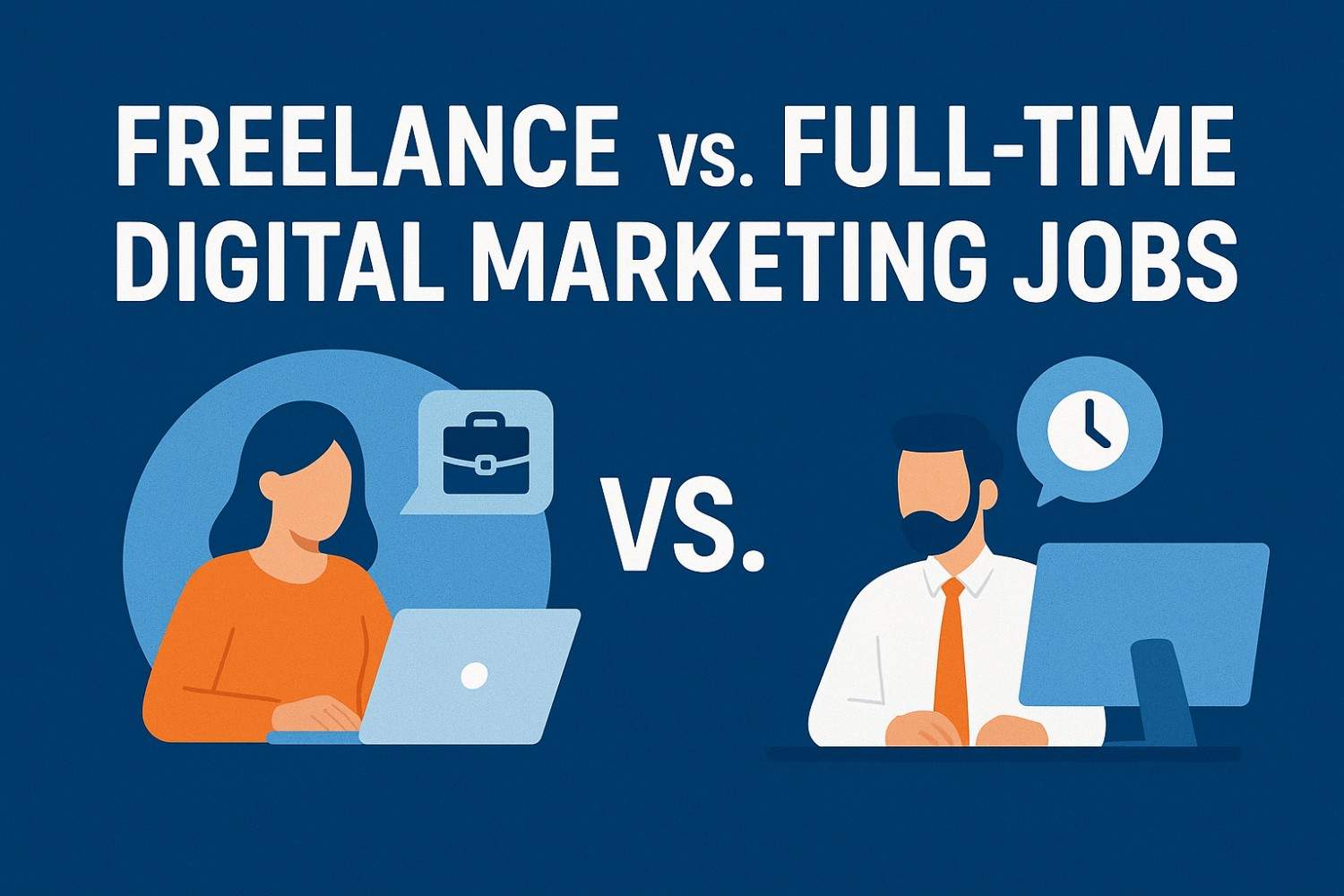Freelance vs. Full-Time Digital Marketing Jobs
The world of digital marketing has exploded over the past decade, becoming one of the most sought-after career fields globally. From small startups to multinational corporations, every business now relies on digital strategies to grow, making skilled professionals in high demand.
As opportunities increase, many professionals face a key decision: Should they pursue freelance digital marketing jobs or commit to full-time employment? Both career paths come with unique advantages and challenges, and choosing the right one depends on your personal goals, lifestyle, and professional aspirations.
In this blog, we’ll break down the differences between freelance and full-time digital marketing jobs, their pros and cons, salary comparisons, and guidance on which path may be best suited for you.
What is a freelance digital marketing job?
A freelance digital marketing job allows professionals to work independently, offering their services to multiple clients on a project or contract basis. Instead of working for a single employer, freelancers build their own client base and manage their schedules.
Common Freelance Roles
- SEO Specialist
- Content Writer or Copywriter
- Social Media Manager
- PPC (Pay-Per-Click) Expert
- Email Marketing Specialist
- Graphic Designer for digital campaigns
Freelancers enjoy flexibility and independence—they can work from anywhere, set their own rates, and select projects that align with their interests.
What is a full-time digital marketing job?
A full-time digital marketing job typically involves working with a company, agency, or organization as part of their in-house marketing team. Professionals in these roles follow a structured work environment with fixed hours and defined responsibilities.
Typical Full-Time Roles
- Digital Marketing Manager
- SEO Analyst
- Social Media Strategist
- Content Marketing Specialist
- PPC/SEM Manager
- Marketing Analyst
Full-time roles offer job security, career growth opportunities, and structured training, making them attractive to professionals seeking stability.
Key Differences Between Freelance and Full-Time Digital Marketing Jobs

- Flexibility vs. Stability—Freelancers enjoy freedom, while full-time employees benefit from predictable routines.
- Earning Potential—Freelancers can earn more if they handle multiple projects, but face income inconsistency. Full-time roles provide steady salaries.
- Workload Management—Freelancers manage multiple clients and deadlines, while full-timers usually focus on company-specific tasks.
- Career Growth & Networking – Full-time jobs often offer structured promotions and mentorship, while freelancers must network independently.
- Work-Life Balance—Freelancers control their schedules but may face burnout; full-time professionals balance predictability with occasional long hours.
Pros and Cons of Freelance Digital Marketing Jobs
Pros:
- Flexible schedules
- Potentially higher income per project
- Opportunity to work with diverse clients
- Remote work freedom
Cons:
- No guaranteed income
- Lack of benefits (health insurance, retirement plans, etc.)
- Isolation from team collaboration
- Self-discipline and time management challenges
Pros and Cons of Full-Time Digital Marketing Jobs
Pros:
- Job stability and consistent income
- Professional training and mentorship
- Employee benefits (insurance, bonuses, paid leave)
- Team collaboration and networking opportunities
Cons:
- Fixed working hours
- Limited flexibility
- Less variety in projects
- Possible office commute stress
Freelance vs. Full-Time Digital Marketing Jobs: Which Is Better for You?
- For Freshers: A full-time job is ideal for beginners since it offers structured learning, mentorship, and industry exposure.
- For Experienced Professionals: Freelancing can be lucrative for those with established skills and networks.
- For Different Lifestyles:
- Digital Nomads: Freelance suits remote-first lifestyles.
- Family-Oriented Professionals: Full-time offers stability and benefits.
- Career-Driven Individuals: Full-time jobs often provide faster career progression.
How to Transition Between Freelance and Full-Time Roles
- From Full-Time to Freelance: Start by taking small freelance projects alongside your job until you build a client base.
- From Freelance to Full-Time: Highlight your diverse project experience and independent management skills in interviews.
- Hybrid Opportunities: Many professionals now balance both worlds with part-time or contract roles.
Conclusion
Both freelance and full-time digital marketing jobs present rewarding career opportunities, but the right choice depends on your lifestyle, financial goals, and career aspirations. Freelancing offers freedom and variety, while full-time roles provide stability and structured growth. By assessing your priorities, you can choose the path that aligns best with your professional journey.
FAQs
1. What is the difference between freelance and full-time digital marketing jobs?
Freelancers work independently with multiple clients, while full-time employees work for one employer with fixed responsibilities.
2. Which is better: freelance or full-time digital marketing?
It depends on your goals—freelance offers flexibility, while full-time ensures stability.
3. Do freelancers earn more than full-time digital marketers?
Freelancers can earn more, but income is inconsistent compared to fixed salaries.
4. Is freelancing riskier than a full-time job?
Yes, freelancing involves income uncertainty and no job security.
5. Can I switch from freelance to full-time digital marketing?
Yes, showcasing your project portfolio helps in landing full-time roles.
6. Which is best for freshers – freelance or full-time digital marketing?
Full-time jobs are better for beginners due to structured learning.
7. What are the challenges of freelance digital marketing jobs?
Client acquisition, inconsistent income, and self-management.
8. What skills are required for freelance digital marketing?
SEO, PPC, content creation, social media, email marketing, and communication.
9. Do full-time jobs offer better career growth in digital marketing?
Yes, they often provide training, promotions, and mentorship opportunities.
10. Can you do freelance and full-time digital marketing together?
Yes, many professionals take freelance projects while working full-time to diversify income.


